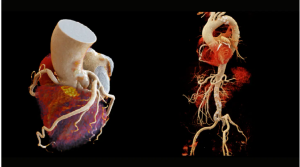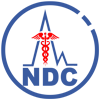OVERVIEW:
What is Cardiac CT?
A cardiac CT, or CT Coronary Angio is an imaging test that uses X-rays to create detailed images of the heart and surrounding blood vessels. It helps detect blockages or narrowing in the coronary arteries (coronary calcium scoring or CT angiography), assess calcium buildup (coronary calcium score), and evaluate the heart’s structure and function. The test involves a table sliding into a CT scanner, and images are reconstructed by a computer to provide diagnostic information for various heart conditions.
What does an Cardiac Ct diagnose?
A Cardiac CT can diagnose and evaluate a wide range of heart and vascular
Conditions diagnosed by Cardiac CT Coronary Artery Disease (CAD):
Detects narrowing (stenosis) or blockages in coronary arteries.
Identifies atherosclerotic plaque (soft, calcified, or mixed).
Coronary Artery Calcium (CAC):
Measures calcium deposits (calcium scoring) to assess future risk of CAD.
Congenital Heart Disease:
Defines structural abnormalities present from birth.
Cardiac Function & Morphology:
Evaluates heart chambers, wall thickness, and ejection fraction.
Cardiac Masses & Tumors :
Detects and characterizes intracardiac or pericardial masses.
Pericardial Disease:
Identifies pericardial effusion, thickening, or constrictive pericarditis.
Great Vessel Abnormalities:
Detects aneurysms, dissections, or anomalies of the aorta and pulmonary arteries.
Post-Operative or Pre-Intervention Planning:
Guides procedures like stent placement, bypass graft ev
Test Details
Who performs an Cardiac Ct ?
A Cardiac CT is performed by a radiology technologist, who operates the scanner and manages image acquisition, while a radiologist or cardiologist specialized in cardiac imaging interprets the results and provides the diagnosis.
What types of Cardiac scanners are used for Cardiac Ct?
Types of Cardiac CT Scanners
Multi-Detector CT (MDCT) Scanners
Most common for cardiac CT.
Uses multiple rows of detectors (e.g., 64-slice, 128-slice, 256-slice, 320-slice).
Higher slice numbers = faster imaging + better detail.
Dual-Source CT Scanners
Have two X-ray tubes and detectors.
Very fast, excellent for patients with high or irregular heart rates.
Provides high temporal resolution.

What are the preparation for Cardiac Ct Test ?
A healthcare professional tells you how to prepare for a CT coronary angiogram. Driving yourself to and from the test should be OK.
Food and Medicines :
Usually, a CT coronary angiogram requires not eating anything for at least 6 hours before the test. Drinking water is OK. Don’t have drinks that contain caffeine 12 hours before. Caffeine can raise the heart rate, making it hard to get clear pictures of the heart.
Tell your healthcare team about the medicines that you take. You may be asked not to take a certain medicine before the test.
Clothing and personal items:
The procedure requires removing jewelry, glasses and clothing above the waist. You’ll be asked to change into a hospital gown.
What happens before a Cardiac Ct ?
Before a CT coronary angiogram, a healthcare professional may give you medicine called a beta blocker. This slows your heart rate to help the CT scanner make clearer images. Let your healthcare professional know if you’ve had side effects from beta blockers in the past.
You also may be given nitroglycerin to widen your coronary arteries. This helps your healthcare professional see the arteries more easily in the images.
What happens during a Cardiac Ct?
During a cardiac ct, your care team:
A healthcare professional places a thin tube called an IV into the hand or arm. Dye, called contrast, flows through this IV. The dye helps blood vessels show up better on the images taken during the test. Sticky patches called electrodes also are attached to your chest to record your heart rate.
You lie on a long table that slides through a short, tunnel-like machine called a CT scanner. If you’re not comfortable in closed spaces, ask your healthcare professional about medicine to help you relax. Do this before the day of your test.
During the scan you need to stay still and hold your breath as directed. Movement can cause blurry images.
A healthcare professional controls the CT machine from a room that’s separated from your exam room by a glass window. An intercom system lets you and the healthcare professional talk to each other.
The scanning parts of the test take as few as five seconds. But the whole process may take up to an hour if you’re given medicines such as beta blockers or nitroglycerin.
What happens after a Cardiac Ct ?
After your CT coronary angiogram is done, you usually can return to your daily activities. You should be able to drive yourself home or to work as long as the CT scan causes no complications. Drink plenty of water to help flush the dye from your body.
What are the benefits of a Cardiac Ct?
Non-invasive – No surgery or catheter, just a scan.
Quick and accurate – Gives clear results within minutes.
Detailed images – Shows heart arteries, valves, and structures in 3D.
Early detection – Finds blockages, calcium, or heart disease early.
Treatment guidance – Helps doctors decide on medicines, stents, or surgery.
Follow-up tool – Checks stents, bypass grafts, or previous heart treatments.
Risk check – Identifies people at higher risk of heart attack or stroke.
What are the risks of a Cardiac Ct?
The risks of a Cardiac CT include exposure to radiation, possible allergic reactions or kidney problems from contrast dye, and rare side effects from medicines given to slow the heart rate. It is generally avoided in pregnancy due to radiation risk.
Who should not get a Cardiac Ct?
Cardiac CT is not suitable for:
- Pregnant women – due to radiation risk to the fetus .
- People with severe kidney disease – as contrast dye may worsen kidney function.
- Patients with severe contrast allergy – risk of serious allergic reaction.
- Patients with very irregular or fast heart rhythms – may reduce image quality.
- People unable to hold their breath or stay still – as movement affects accuracy.
Results and Follow-Up
When should I get the test results?
Cardiac CT results are usually reviewed by a radiologist or cardiologist and are available within a few days. In urgent cases, results may be given the same day. Your doctor will then discuss the findings with you and explain the next steps.
What is The Result of Cardiac Ct?
The images from your CT coronary angiogram should be ready soon after your test. The healthcare professional who asked you to have the test gives you the results.
If your test suggests that you have or are at risk of heart disease, you and your healthcare professional can talk about treatment options.
Regardless of the test results, it’s always a good idea to make lifestyle changes to help protect the heart. Try these heart-healthy habits:
- Get regular exercise. Exercise helps manage weight and control diabetes, high cholesterol and high blood pressure — all risk factors for coronary artery disease. Get at least 150 minutes of moderate aerobic activity or 75 minutes of vigorous aerobic activity a week, or a combination of moderate and vigorous activity.
- Eat healthy foods. Eat plenty of fruits, vegetables, whole grains, legumes and nuts. Avoid saturated fats and trans fats. Reduce salt and sugar. Eating one or two servings of fish a week also may help keep the heart healthy.
- Lose extra weight. Reaching a healthy weight and staying at it is good for your heart. Losing even a small amount of weight can help reduce risk factors for coronary artery disease. You can ask your healthcare professional to set a goal weight for you.
- Don’t smoke or use tobacco. Smoking is a major risk factor for coronary artery disease. Nicotine tightens blood vessels and forces the heart to work harder. Not smoking is one of the best ways to lower the risk of a heart attack. If you need help quitting, talk with your healthcare professional.
- Manage health conditions. For high blood pressure, high cholesterol or diabetes, take medicines as directed. Ask your healthcare professional how often you need health checkups.
- Lower stress. Stress can cause blood vessels to tighten. This raises the risk of a heart attack. Some ways to ease stress are to get more exercise, practice mindfulness and connect with others in support groups.
- Get enough sleep. Adults should try to get 7 to 9 hours of sleep a night.
Care at North City Diagnostic
If you have concerns about your Heart’s blood vessels or circulation, you need a team of experts you can trust. Our Cardiologists and Radiologists at North City can help with Cardiac Ct (CT Coronary Angiography).

